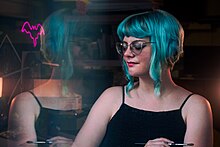The topic of this article may not meet Wikipedia's notability guideline for biographies .(August 2024) |
Kelly McKernan | |
|---|---|
 Kelly McKernan in their studio, 2023 | |
| Born | 1986 |
| Education | Kennesaw State University |
| Website | |
| www | |
Kelly McKernan (born 1986) is an American artist based in Nashville, Tennessee. [1] [2] [3]